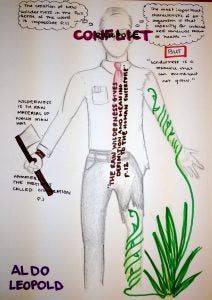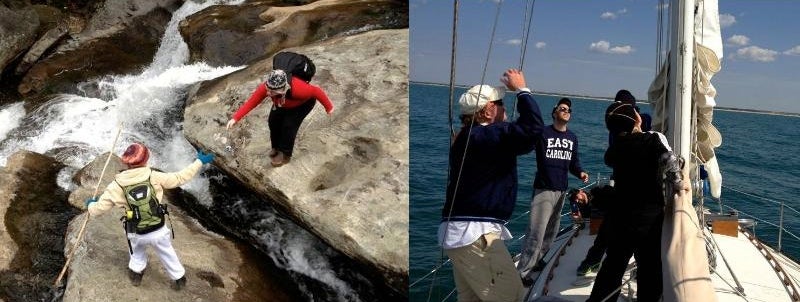Wilderness Writing: Bringing Interdisciplinary Writing to Bear on Environmental Ethics
(Today’s blog post comes from Stephanie West-Puckett, teaching instructor in the department of English and Associate Director of the Tar River Writing Project. Stephanie teaches first-year and advanced writing courses; in her research, she investigates digital literacies and the impact of digital cultures on student writing practices. Currently, she serves as the project coordinator for TRWP’s Project Connect at J. H. Rose high school in Greenville.)
by Stephanie West-Puckett
In Spring 2011, Dr. Ashley Egan from Biology designed a new course that would increase students’ awareness of the natural world and wilderness while challenging them to formulate a public environmental ethic. Drawing from her experience as a field botany instructor and from a deep knowledge of biodiversity and systematics, she was confident teaching the natural science content but felt the course would be strengthened by partnering with a faculty member who specialized in writing studies and the teaching of writing. I was thrilled to jump on board, and together, we co-designed and co-taught Wilderness Writing as an Honors College seminar that brought interdisciplinary knowledges to bear on problems of environmental ethics. Through a combination of scientific and cultural readings and discussion, intensive immersion in wilderness settings, and writing about nature for a variety of audiences, purposes, and media, students developed arguments about the definitions, values, and purposes of “wilderness”, and published ethical manifestos to communicate those understandings to a broad public.
Structured after the lecture/lab model that is common in the natural sciences, Tuesday “lecture” sessions quickly morphed into humanities-based discussions as students brought their own experiences and attitudes to the texts. On Thursdays, the class met in natural classrooms such as River Park North and Green Springs Park, where they learned about natural history and fossils, biodiversity and invasive plant species, the power of the elements, and wilderness survival skills. Students kept daybooks in the field, observing and taking field notes as scientists, interpreting experiences and natural “texts” to make meaning as humanists.
 Two overnight trips offered the experiences of bouldering on the Hebron Rock Colony, exploring the Linville Gorge, and hiking a strenuous Grandfather Mountain Trail in the Appalachians, as well as backpacking and camping with the wild horses on Shackleford Banks. With shaky legs and sore backs, students wrote and shared in situ about these wild landscapes and their own bodies. Many of these writings, and their environmental ethics manifestos are published online, and you can visit www.wildernesswriting.wordpress.com to review the course blog and explore individual student blogs as well as the collaborative Google Map Layer that geo-tags their compositions to the physical locations they studied.
Two overnight trips offered the experiences of bouldering on the Hebron Rock Colony, exploring the Linville Gorge, and hiking a strenuous Grandfather Mountain Trail in the Appalachians, as well as backpacking and camping with the wild horses on Shackleford Banks. With shaky legs and sore backs, students wrote and shared in situ about these wild landscapes and their own bodies. Many of these writings, and their environmental ethics manifestos are published online, and you can visit www.wildernesswriting.wordpress.com to review the course blog and explore individual student blogs as well as the collaborative Google Map Layer that geo-tags their compositions to the physical locations they studied.
This interdisciplinary teaching project gained ground as a teacher inquiry project as we were granted clearance from the Institutional Review Board to conduct human participants research with the Wilderness Writing students and developed our capacity to study and make knowledge around interdisciplinary teaching and learning. As former participants of ECU’s WAC Academy, both Ashley and I feel this story demonstrates the partnerships, innovation, development, and teacher research lens that can be supported through the University Writing Program.


